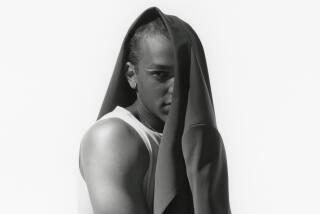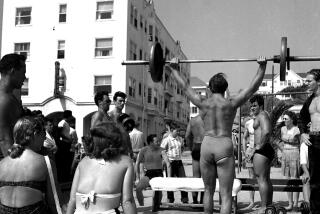VIEWPOINT : The slightly odd-shaped should appreciate their good fortune. : Sartorially Fated Not to Fit In
- Share via
It’s bad enough that nobody can pronounce my name. The real problem is that nothing fits me. The comfortable life of a contemporary American is secretly filled with alienating experiences, but none for me is more alienating than trying to buy clothes. You’d think I came from Mars.
Actually, I have just come from searching the San Fernando Valley for a tuxedo, and the experience was a dispiriting one. Literature is filled with the romance of the misfit, but denizens of department stores know otherwise. If you don’t fall within certain parameters, you’re out of luck. As much as possible, I avoid the whole thing, and instead wear what I have until it hangs in tatters from my bones.
By now you may have guessed that my proportions are unconventional. I am too tall, my shoulders are too broad, and I am too skinny throughout. I have big feet, long legs, unruly hair, not much neck, and God knows what other irregularities. Fatties who envy my blast-furnace metabolism have my sympathy, but I’ll bet they have an easier time finding stuff to wear.
In the past this hasn’t been much of a problem. I had no money, therefore couldn’t afford to buy anything. Most of what I wore didn’t fit, or was intended for a different kind of work than I do. This was an easy solution: work clothes inexplicably tended to come in more extreme sizes, as if the supposed regimentation of office work was believed to extend even to the physical dimensions of the worker.
Now that my salary has crept above the minimum wage (newspapers would employ migrant labor if there were no language barrier), I find my expectations inevitably rising. I begin to chafe at the collar of exclusion, now that I can afford shirts that hide my wrists, or pants that aren’t made out of thick twill. But where to find them?
Department stores usually aren’t much good. They conceive the universe as a great bell curve, and want to carve only from the rich bulge in the center. Those of us strung out on the asymptotic ends of the graph have no place under these merchants’ roofs.
Big men’s shops are even worse. Wrapped in euphemism (Jackie Gleason and A.J. Liebling are my favorite “big men”), these ghettos for deviant physiques offer an enticing collection of goods that might have been in the fashion forefront in Oklahoma City during the early 1970s. Certainly the selection is vast: None of polyester’s many permutations is missing, and for those whose tastes run to leisure suits, these stores are nirvana indeed.
Conventional men’s stores are little better. Sure, they might have nicer things, or more sizes, but they also have more pretensions. The salesmen carry themselves with the pride of a Spanish hidalgo, condescending to assist in the selection of one of their shmattas and then helping you try it on with a flourish worthy of a bullfighter. Later, the store’s fitters will mutter darkly toward the floor as they hopelessly tug and shift, the benighted garment lying no more sedately across the recalcitrant frame.
On the other hand, perhaps I should count myself lucky. The truth is that I like clothes a little too well, but the experience of acquiring any is so positively frustrating that I don’t bother, which saves me time and money. Fashion becomes meaningless, a source of amusement. It is a kind of mortification, this exclusion from the world of appearances, and maybe it helps focus the mind. Certainly it tempers hubris.
This is odd, because luck is usually associated with hubris. But consider: To have big feet is to realize, sooner or later, that you have feet, and this awareness is extremely valuable. With a place to live, food to eat, honorable labor and a body in working order (however motley in appearance), being invisible to the world’s clothing manufacturers makes you lucky in knowing as well as in being.
Unfortunately, the sword is two-edged. Just as the slightly odd-shaped should appreciate their good fortune in not being worse off, they should know better than most people that appearances are deceiving, that beauty isn’t even skin-deep, etc. But in my experience we do not.
On the contrary, unlike the truly misshapen, all us moderate misfits have to beware our own deep desire for conformity, our own susceptibility to what other people consider beautiful. Otherwise what good are we?






